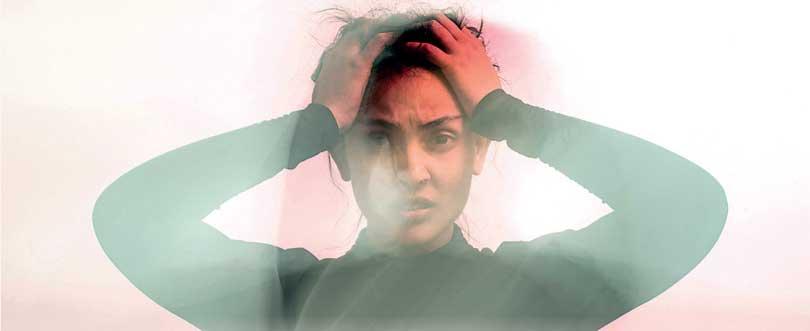20 Apr 2024 - {{hitsCtrl.values.hits}}


Looking through the myriad treatment options discussed on my podcast for anxiety opens up a world where traditional therapies and ground-breaking innovations converge.
In a world increasingly defined by its complexity and relentless pace, anxiety has emerged as the defining challenge of our era. This isn't just about the occasional worries that flutter through our minds. It's about a pervasive sense of unease that has settled over the general population. Climate change, political unrest, and social inequality aren't distant concerns but immediate realities, thanks to the 24/7 news cycle. I feel like Gen Z carries the weight of the world on its shoulders the most. Young people are negotiating personal anxieties against a backdrop of global tumult.
 As a wellness enthusiast, navigating the future of anxiety treatment feels a bit like setting sail into uncharted waters. So, I asked mental health professionals on my podcast for their insights on the current state of research, and their patient experiences with these novel treatments. Holistic psychotherapist Bushra Khan said in the episode, "right now, all my clients are suffering from anxiety. RTT (Rapid Transformational Therapy) is amazing for anxiety. We find out where the trauma or belief is sitting, and we give them an understanding of it. Then we give the recording to give your brain new neural pathways, a new way to think about it and literally make you think about that thought and your mind. We go and change your subconscious mind because that’s where you’re holding all your memories, habits and beliefs.”
As a wellness enthusiast, navigating the future of anxiety treatment feels a bit like setting sail into uncharted waters. So, I asked mental health professionals on my podcast for their insights on the current state of research, and their patient experiences with these novel treatments. Holistic psychotherapist Bushra Khan said in the episode, "right now, all my clients are suffering from anxiety. RTT (Rapid Transformational Therapy) is amazing for anxiety. We find out where the trauma or belief is sitting, and we give them an understanding of it. Then we give the recording to give your brain new neural pathways, a new way to think about it and literally make you think about that thought and your mind. We go and change your subconscious mind because that’s where you’re holding all your memories, habits and beliefs.”
CBT and Medication
CBT [Cognitive Behavioural Therapy] stands as our compass in the world of anxiety treatment. It's reliable, well-understood, and, frankly, a lifesaver for many. Dr Abhinit Kumar from the Department of Psychiatry at Sharda Hospital said, “anxiety disorders can range from generalised anxiety (GAD), OCD and social anxiety to specific phobias such as fear of crowded places. Depending on the severity of the symptoms, we approach treatment. If the person has anxiety but is still functional in their daily duties, then psychotherapy, particularly CBT, is the way to go. For moderate to severe cases, we blend psychotherapy with pharmacology. We bring in medication like SSRI, SNRIs and others.” He stressed the importance of sticking with the treatment for about 6-8 months and then tapering out the medication. The pacing is crucial to avoid relapse.
Dr Kumar also brought an interesting point to the table, CBT isn't just for the person experiencing anxiety. Caregivers can benefit from it too, helping them navigate their own journey through the caregiving process. And with the advent of technology, eCBT (via videoconferencing or telephone) has made it possible to extend this support far and wide.
Shahana Zehra, clinical psychologist at mental health platform LISSUN, reminded me that when it comes to treatment, one size doesn't fit all. Cultural background plays a massive role in how anxiety manifests and how treatment should be approached. She explained, "we need to consider individualistic and culturally sensitive treatment plans. It's about understanding each person's unique story, their upbringing, family values, and the society they're part of. This tailored approach helps in crafting more effective, personalised treatment plans.”
Exploring new territories
The mention of psychedelics as a treatment for anxiety often raises eyebrows. It's the new frontier, promising yet peppered with questions and controversies.
While microdosing of psychedelics, including psilocybin, LSD and MDMA – have shown promise in clinical trials, concerns regarding side effects, addiction, and the lack of trained professionals for supervised treatment persist. “These new and alternative treatments for anxiety disorders are still at the experimental stage and need professional medical supervision,” said Dr Kumar, highlighting concerns about side effects and the need for controlled, supervised treatment settings. Added Zehra, “Psychedelics for treatment is new territory and a rather controversial topic. Even marijuana is legalised in some countries for medical purposes. However, if it is not taken under supervised conditions, it can have serious consequences.” She pointed out the scarcity of trained professionals, especially in the Asian subcontinent, which adds another layer of complexity to using psychedelics responsibly.
The journey doesn't end here. The exploration of anxiety treatment reveals more tools and strategies that can complement traditional approaches. Said certified yoga expert Amrita Mann, “Any kind of pranayama really helps. It makes you understand a deeper aspect of yourself. It calms you down for the moment. Pranayama is ideally done before the meditation because it calms your mind. Then your mind is not all over the place, which is why it also helps with mental health issues.”
Zehra recommended somatic therapy to tap into the body-mind connection, offering a holistic path to managing anxiety. She added, “journaling is a powerful tool to process thoughts and emotions. It can act as a personal anchor in turbulent times.” She also believes in the potential of AI in developing self-care modules and strategies, ensuring that support is available even when a therapist isn't. It's like having a first aid kit for mental health, accessible anytime, anywhere.
As we chart the course forward in anxiety treatment, it's clear that a blend of traditional and innovative approaches, grounded in personal and cultural understanding, holds the key. The future of anxiety treatment is not just about finding new remedies but about creating a more nuanced, compassionate, and inclusive approach to mental health.
26 Dec 2024 2 hours ago
26 Dec 2024 3 hours ago
26 Dec 2024 4 hours ago
26 Dec 2024 6 hours ago
26 Dec 2024 7 hours ago